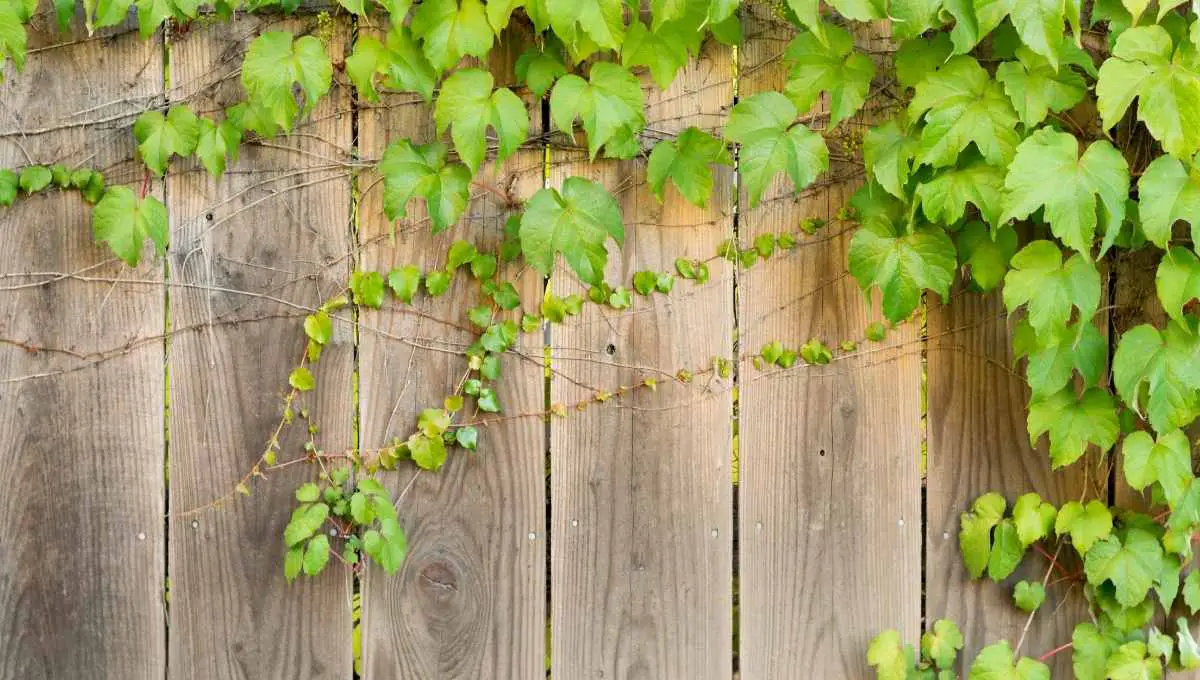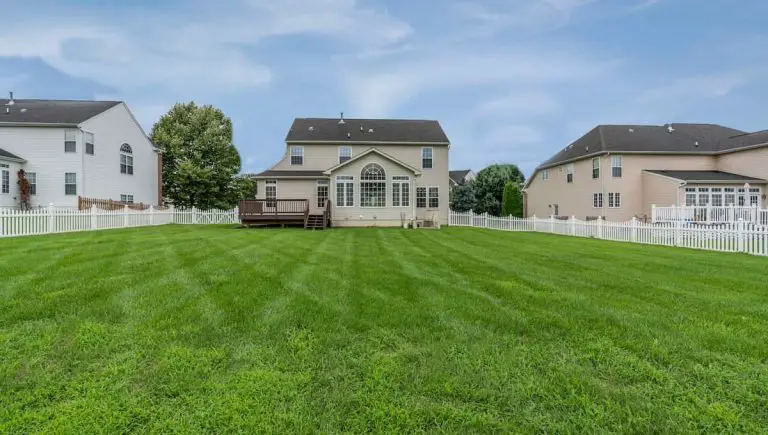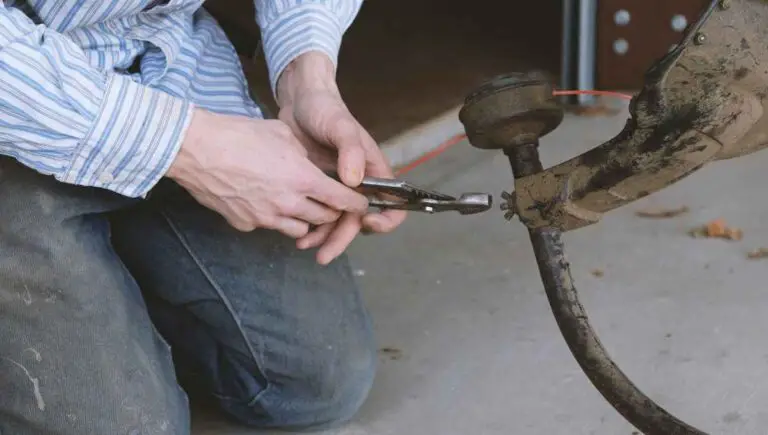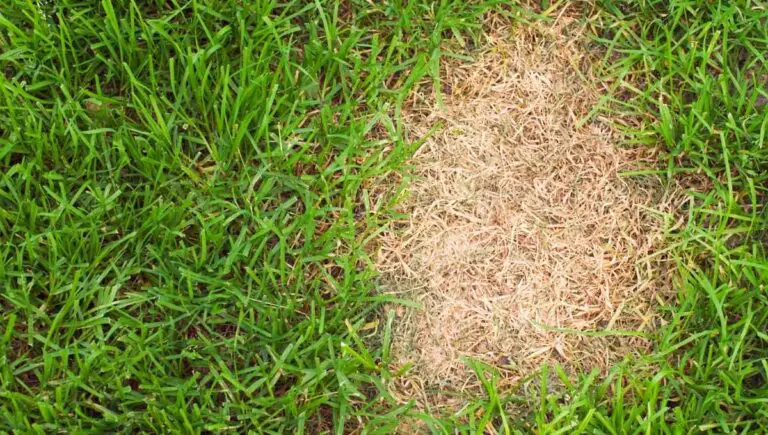How to Stop Neighbors Vines From Growing on My Fence ASAP

If you live in a climate with warm weather, it’s not uncommon for your neighbor’s vines to grow on the fence that separates your yards. Unless you have a good relationship with them, this can be very frustrating. What can you do to stop your neighbor’s vines from growing on your fence?
You can stop a neighbor’s vines from growing on your fence by politely speaking with your neighbor about the situation first. If talking doesn’t work, you are completely within your legal rights to trim any vines or branches that hang over your side of the fence.
If you’re unsure about how to deal with your neighbor’s vines, we’ve got you covered. We’ll provide you with tips on what you can do to protect your property from invasive vines, and prevent them from growing uncontrollably in the first place.
This post contains affiliate links from Amazon and other stores. This means Yard Blogger may earn a commission if you make a purchase using any of our links. Please refer to our full affiliate disclosure policy for full details.
Here’s a Quick Pro Tip!
Getting rid of vines that are growing on your fence doesn’t have to be complicated or expensive.
While you could go the route of trying to pull them up yourself by hand, an easier and smarter way would be to use these tools…
Here are some things that you can use to get the job done:
1. Tabor Tools Anvil Lopper – Makes it much easier to trim the vines off of the fence instead of pulling them by hand.
2. Black & Decker Electric Hand Saw – Very quick and easy way to remove thick strong vines that’ll save you tons of time.
3. Compare-N-Save Weed & Grass Killer – This will kill the vines at the root and help prevent them from coming back again.
4. Calyptus 45% Pure Super Concentrated Vinegar – This is a more natural home remedy that you can use to kill vines if you’re not into using commercial herbicides.
You can pick all of these up at a pretty affordable price on Amazon.
How Do I Stop My Neighbor’s Vines From Growing on My Fence?
A neighbor’s invasive vines or shrubbery can easily be a cause for disputes. After all, you would not want to periodically trim off branches of plants that don’t belong to you or have to rake the trimmings that fall on your property.
Not only that, overgrown vines that fall to your side of the fence have the potential to damage your fence or even your roof or gutter if they grow that tall. That’s another cleaning or repair job if dead leaves accumulate in that area and cause problems.
Because of this, it’s only natural for you to search for solutions on how to control overhanging vines. In this case, it will be a real challenge to deal with vines, especially persistent, weedy ones. A neighbor who doesn’t tend to his garden or doesn’t bother with taming the vine also adds to that challenge.
If you’re one to deal with this problem, there may be many questions running through your head. You may wonder whose responsibility will it be to cut the vines that grow over your fence knowing that the plant is not yours? Will your neighbor help you trim it to restore your yard’s aesthetics?
What if the overgrown vines damaged your fence, your gutter, or your roof? Who will pay for the repair costs? Will the neighbor solely pay for the damages or will you have to split the expenses?
You are Responsible for Your Property
The answer will depend on where you live but generally, a homeowner should be responsible for what happens on his property.
Let’s say the neighbor’s vines growing on my fence bothers me a lot. But I can’t deny the fact that the overhang is on my side, so it should be my responsibility to cut them off, even if it’s not my plant.
However, this does not mean that you should do whatever you please to the vine. If you end up harming or killing the plant, you could still be held liable so it’s better to act reasonably.
Neighbor’s vines damaging my fence may be a different story. If the vigorous plant growth resulted in damages, there are two solutions: split the costs with your neighbor or have him pay for all the damages.
Talk to Your Neighbor
Meanwhile, there is another solution that doesn’t take into legal consideration: talk to your neighbor. In fact, communicating should be the first step to take.
Let your neighbor know how you feel about regularly cleaning up after his plants. Perhaps, let them know that clearing vines on your fence are an added chore that you wish you didn’t have to do. Who knows? Your neighbor might be sensible enough to understand.
On the other hand, if you’d rather not approach your neighbor or perhaps you just don’t want to have to clean up after a plant that you don’t own, then there are other means on how you can get rid of the vines and stop it from growing over your fence.
You might also enjoy our post on What to Do if Your Dog Eats a Dead Bird
How Do You Get Rid of Vines on a Fence?
If you’ve been bothered by your neighbor’s vines for so long, you may have been looking for the best products or tools to get rid of them. The good news is that there are options for dealing with invasive vines in your yard.
The two primary methods of getting rid of vines that grow over your fence are mechanical or physical removal and chemical methods.
Physical removal involves pulling, weeding, or cutting off the vines while the chemical method involves using an herbicide to kill vines. We will discuss both methods further in this section.
Physical Methods

The physical method of controlling vine growth involves digging or hand pulling. When using this method, make sure that you’re working with moist soil and you’re dealing with lighter infestations. More importantly, always wear protective gloves.
It’s recommended to use a pair with forearm protection like NoCry Long Leather Gloves.
To really minimize the growth, it’s important to tackle the vine roots that are underground. You might also need to remove tubers, rhizomes, bulbs, and all. Controlling vine overgrowths this way should not be a one-time thing but a regular gardening task.
It would also be more effective if you start out by cutting the growths that are on your fence (or those that have touched your house) and then followed by digging the roots.
We personally recommend using an Anvil Lopper like this one from Tabor Tools on Amazon.
You can imagine how hard this can be – and yes, it won’t be an easy feat. Physical removal of vines is an added task that requires stamina and strength.
If you don’t have the physical capacity to take on the job or if you’re lazy and don’t have the time, then the best thing to do would be to hire someone to do it. You’ll be left with the job of making sure the vines don’t grow crazy again.
Another thing to remember about cutting down vines is to never do it occasionally without addressing the roots. This will get you nowhere as the vines will simply regrow and thrive even more.
Chemical Methods
Herbicides may be used in stopping the growth of vines but must be done carefully so as not to kill off surrounding vegetation that you actually want. Also, you don’t want to kill your neighbor’s plant either as that could get you in trouble.
Still, if using herbicides is extremely necessary or if somehow you and your neighbor agreed on its use, you have to understand how to apply it the right way. When spraying herbicides, make sure to protect nearby plants that you don’t intend to kill.
You can do this by covering the plants with plastic bags or sheets. Killing vines using herbicides only requires you to target the foliage; you don’t have to spray the roots or base.
However, when you spray, don’t overdo it as the chemicals may run off to the ground and cause more trouble to the surrounding plants.
Herbicides are usually absorbed through the foliage, so you simply need to spray on the leaves. The chemical then travels to the plant’s circulatory system and is transported to the roots, ultimately killing the plant.
Using Herbicides To Kill Vines
As mentioned, herbicides should be used with caution, especially when other people’s plants are involved. Before you use a vine killer, make sure you ask permission from the neighbor or at least let them know what you’re planning to do.
You might not know it but your neighbor might be holding off on killing the vine themselves and you offering to do the task might be just the thing they need.
This way, you not only get rid of the pesky plant off your fence or your side of the house but you will also create a positive relationship with your neighbor.
What Herbicide Kills Vines?

There are a couple of herbicides that are popularly used to control vine overgrowths – glyphosate and triclopyr. The difference between the two is that glyphosate is a systemic herbicide while triclopyr is a selective herbicide.
Glyphosate, which is the active ingredient in many popular brands of weed killer is a systemic herbicide, which means that in order for it to work, it should be absorbed into the plant roots and tissues.
Glyphosate is a powerful chemical, but it’s so powerful that you need to use it carefully since it’s non-selective. This means that the product kills all plants that it comes in contact with.
There is also a big controversy surrounding whether or not glyphosate causes cancer. The biggest claim comes from the International Agency for Research on Cancer, which released a study in 2015, concluding that glyphosate is “probably carcinogenic to humans”.
While this doesn’t prove anything beyond a shadow of a doubt, it does raise a concern about the safety of glyphosate, and you should think twice before using products that contain it.
Compare-N-Save Weed & Grass Killer can also be used if you have overgrowth problems with weeds, brush, flowers, grass, and woody trees. One thing to note is that the effect of using Compare-N-Save Weed & Grass Killer will not show immediately.
Be patient as it takes time for the chemical to be distributed to the plant system and kill it off.
Vine-killing herbicides may be effective in controlling those vines but they also take time to break down in the soil. That said, you have to apply this product mindfully or else, it may runoff into the soil and may discourage plant growth or affect the growth of existing plants.
Triclopyr is also another herbicide to consider. It is a selective herbicide that can be effective for vine and brush, without hurting nearby vegetation.
Between triclopyr and glyphosate, triclopyr is recommended when controlling the growth of woody vines.
Best Homemade Vine Killers
If you don’t want to use strong commercial herbicides, there’s always the option of using substances that are already in your home.
Vinegar and bleach are two popular readily available products that have been used by many homeowners when dealing with unwanted plant growths. But will they be effective against vines?
Will Vinegar Kill Vines?

Vinegar is a popular multi-purpose ingredient that not only works in the kitchen but also has gardening applications. In our previous post, we discussed how vinegar can be used to get rid of mushrooms popping up on your lawn. But will vinegar also work on vines?
Some homeowners swear by vinegar as a remedy for pesky vines. This would be a non-toxic option for those who don’t like to use chemicals found in commercial herbicides. To use vinegar, use 20% white vinegar and mix it with 80% water. Spray the mixture onto the vines.
This may not produce an immediate effect, but it can still be a decent alternative.
Check the vines in two to three days and you will notice some dead vines. Pull them out and dispose of them properly. If necessary, you can spray again until you no longer notice vine growths.
We personally recommend Calyptus 45% Pure Super Concentrated Vinegar to get the job done right.
Will Bleach Kill Vines?

Clorox Bleach can also be used to kill vines just like it can be used to kill weeds. However, bleach can easily kill off grass or plants nearby so caution must be observed when using bleach. Between bleach and vinegar, the latter offers a more natural approach to controlling stubborn vines.
You might also enjoy our post on What Kills Weeds Permanently So They Never Come Back?
How to Deal With Hard to Kill Vines
Hard-to-kill vines are usually vine growths that are not managed properly. You can’t just cut the vines and forget about them because they can easily grow back. To effectively kill off vines, make sure you address the root system.
Below are steps on how to kill ground vines and prevent their regrowth. Note that this method also works for killing underground vines.
- Cut the vines until they’re left with only few inches from the ground
- Treat the stump with an herbicide to prevent new growths.
- Pretty soon, the vines will slowly die off because they have absorbed the chemicals.
- Finally, clear the ground by digging out the dead vines. You can also cut the small vine roots into pieces as you till the ground. Leave them there to decompose.
How Do I Stop Vines From Growing on My Fence?
We have already mentioned the chemical and physical removal of vines, but preventing their growth in the first place would be much more practical in the long run. There are other options in making sure your neighbor’s vines don’t overtake your property.
If you’d rather not touch your neighbor’s vines for the sake of maintaining a good relationship or you simply don’t want to have something to do with vine control, here are a few tips:
- Talk to your neighbor – the first step in dealing with vines is to talk to the owner about their plant. They might not realize that it’s bothering you, so give it a shot. They might be willing to take care of the problem.
- Change your fence – if you have a chain-link fence, you may need a new one if you seriously don’t want shrubs and vines to grow crazy on your property. A chain-link fence’s holes allow the plants to cross over to your side of the fence quickly.
- Get a Panel Fence – A panel fence, on the other hand, limits the growth in such a way that you don’t have to worry about your neighbor’s plant. If vines are overhanging on your side of the fence, you can simply cut them off to keep your property looking neat.
Conclusion
If you’re wondering about “how to stop neighbors vines from growing on my fence,” then you’ll be presented with options. The quickest solution may be to use herbicides but you have to think about your neighbor if this sits well with them.
If you’re conscious about the environment, this may not be the solution you’re looking for.
An alternative would be to use vinegar, which is less toxic but can do the job effectively. If you want to know what to use to kill vines on a fence without using chemicals, then know that there’s always the manual removal of the vines, which is hard labor.
Another is to assess the kind of fence you have. A panel fence is the best way to keep vines at bay because vines that hang over your side of the fence can easily be trimmed without hurting the mother plant.






